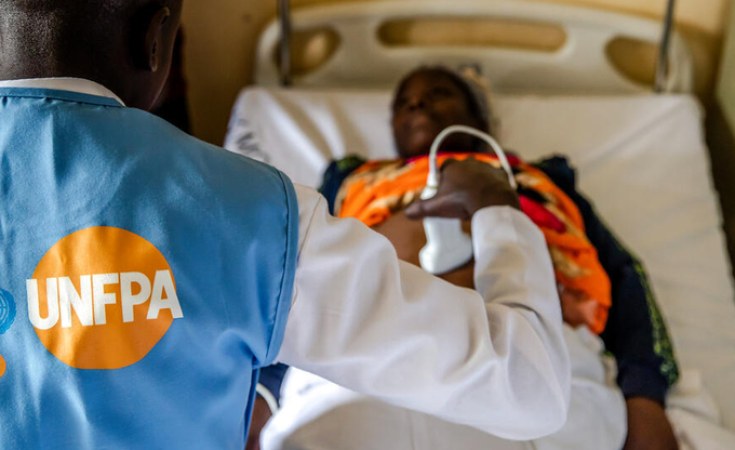The report noted that in 2020, 788 women and children died 'per thousand' in India and 540 women and children 'per thousand' died in Nigeria.
A new report has shown that Nigeria accounts for the second-highest number of maternal and child deaths globally.
The report, which was titled: 'Improving maternal and newborn health and survival and reducing stillbirth: Progress Report 2023' and released by the World Health Organisation (WHO) on Tuesday shows that Nigeria, Africa's most populous nation is only behind India in the latest ranking.
The report noted that in 2020, 788 women and children died 'per thousand' in India and 540 women and children 'per thousand' died in Nigeria.
In the same year, India accounted for 17 per cent of global maternal, and neonatal deaths and stillbirths, while Nigeria accounts for 12 per cent.
Eight other countries with high maternal, neonatal , and stillbirths are Pakistan, the Democratic Republic of the Congo, Ethiopia, Bangladesh, China, Indonesia, Afghanistan, and the United Republic of Tanzania.
The report estimates that globally, there were a combined 4.5 million maternal, neonatal deaths and stillbirths in 2020.
"Sub-Saharan Africa and Central and Southern Asia are the regions experiencing the largest numbers of deaths, although, across all regions, there is variation regarding the pace at which countries are progressing in their efforts to achieve the global 2030 targets.
"The top 10 countries with the highest-burden account for 60 per cent of global maternal deaths, stillbirths, and newborn deaths, and 51 per cent of the world's live births," the report noted.
Nigeria in retrospect
It is no longer news that Nigeria's Maternal Mortality Rate is one of the highest in the world.
The United Nations Economic Commission for Africa says that one in seven global maternal deaths occurs in Nigeria. That is more than 50,000 women dying per year in Nigeria.
Health experts, however, said about 95 per cent of deaths during childbirth are preventable.
Nigeria's health minister, Osagie Ehanire, had earlier attributed the high maternal, infant and under-five mortality in the country to lack of access to quality healthcare services.
The report
Speaking on the report, the WHO in a statement said COVID-19 pandemic, rising poverty, and worsening humanitarian crises have intensified pressures on stretched health systems.
It said according to the report, global progress in reducing deaths of pregnant women, mothers and babies has flatlined for eight years due to decreasing investments in maternal and newborn health.
The WHO, Director of Maternal, Newborn, Child and Adolescent Health and Ageing, Anshu Banerjee, said pregnant women and newborns continue to die at unacceptably high rates worldwide.
Mr Banerjee said the COVID-19 pandemic has created further setbacks to providing women and babies with the healthcare they need.
"If we wish to see different results, we must do things differently. More and smarter investments in primary healthcare are needed now so that every woman and baby - no matter where they live - have the best chance of health and survival," he said.
In his remark, Steven Lauwerier, UNICEF Director of Health, said since the COVID-19 pandemic, babies, children, and women who were already exposed to threats to their well-being, especially those living in fragile countries and emergencies, are facing the heaviest consequences of decreased spending and efforts on providing quality and accessible healthcare.
Mr Lauwerier said funding shortfalls and underinvestment in primary healthcare can devastate survival prospects.
"For instance, while prematurity is now the leading cause of all under-five deaths globally, less than a third of countries report having sufficient newborn care units to treat small and sick babies," he said.
"Meanwhile, around two-thirds of emergency childbirth facilities in sub-Saharan Africa are not considered fully functional - meaning they lack essential resources like medicines and supplies, water, electricity or staffing for 24-hour care."
Human Rights' violation
The Director of the Technical Division at the United Nations Population Fund (UNFPA), Julitta Onabanjo, said the death of any woman or young girl during pregnancy or childbirth is a serious violation of their human rights.
Ms Onabanjo said this also reflects the urgent need to scale up access to quality sexual and reproductive health services as part of universal health coverage and primary health care, especially in communities where maternal mortality rates have stagnated or even risen during recent years.
"We must take a human rights and gender transformative approach to address maternal and newborn mortality, and it is vital that we stamp out the underlying factors which give rise to poor maternal health outcomes like socio-economic inequalities, discrimination, poverty, and injustice," she said.
She said to increase survival rates, women and babies must have quality and affordable healthcare before, during, and after childbirth as well as access to family planning services.
She noted that more skilled and motivated health workers, especially midwives, are needed, alongside essential medicines and supplies, safe water, and reliable electricity.


